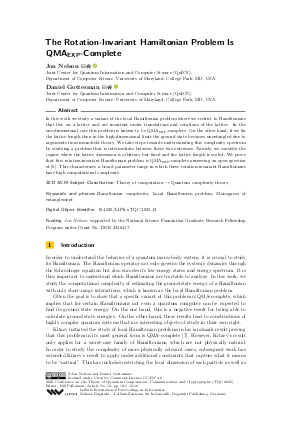The Rotation-Invariant Hamiltonian Problem Is QMA_EXP-Complete
Authors
Jon Nelson  ,
Daniel Gottesman
,
Daniel Gottesman 
-
Part of:
Volume:
20th Conference on the Theory of Quantum Computation, Communication and Cryptography (TQC 2025)
Part of: Series: Leibniz International Proceedings in Informatics (LIPIcs)
Part of: Conference: Conference on the Theory of Quantum Computation, Communication and Cryptography (TQC) - License:
 Creative Commons Attribution 4.0 International license
Creative Commons Attribution 4.0 International license
- Publication Date: 2025-09-09
File

PDF
LIPIcs.TQC.2025.12.pdf
- Filesize: 1.14 MB
- 18 pages
Document Identifiers
Subject Classification
ACM Subject Classification
- Theory of computation → Quantum complexity theory
Keywords
- Hamiltonian complexity
- Local Hamiltonian problem
- Monogamy of entanglement
Metrics
- Access Statistics
-
Total Accesses (updated on a weekly basis)
0PDF Downloads0Metadata Views
Abstract
In this work we study a variant of the local Hamiltonian problem where we restrict to Hamiltonians that live on a lattice and are invariant under translations and rotations of the lattice. In the one-dimensional case this problem is known to be QMA_EXP-complete. On the other hand, if we fix the lattice length then in the high-dimensional limit the ground state becomes unentangled due to arguments from mean-field theory. We take steps towards understanding this complexity spectrum by studying a problem that is intermediate between these two extremes. Namely, we consider the regime where the lattice dimension is arbitrary but fixed and the lattice length is scaled. We prove that this rotation-invariant Hamiltonian problem is QMA_EXP-complete answering an open question of [Gottesman and Irani, 2013]. This characterizes a broad parameter range in which these rotation-invariant Hamiltonians have high computational complexity.
Cite As Get BibTex
Jon Nelson and Daniel Gottesman. The Rotation-Invariant Hamiltonian Problem Is QMA_EXP-Complete. In 20th Conference on the Theory of Quantum Computation, Communication and Cryptography (TQC 2025). Leibniz International Proceedings in Informatics (LIPIcs), Volume 350, pp. 12:1-12:18, Schloss Dagstuhl – Leibniz-Zentrum für Informatik (2025)
https://doi.org/10.4230/LIPIcs.TQC.2025.12
BibTex
@InProceedings{nelson_et_al:LIPIcs.TQC.2025.12,
author = {Nelson, Jon and Gottesman, Daniel},
title = {{The Rotation-Invariant Hamiltonian Problem Is QMA\underlineEXP-Complete}},
booktitle = {20th Conference on the Theory of Quantum Computation, Communication and Cryptography (TQC 2025)},
pages = {12:1--12:18},
series = {Leibniz International Proceedings in Informatics (LIPIcs)},
ISBN = {978-3-95977-392-8},
ISSN = {1868-8969},
year = {2025},
volume = {350},
editor = {Fefferman, Bill},
publisher = {Schloss Dagstuhl -- Leibniz-Zentrum f{\"u}r Informatik},
address = {Dagstuhl, Germany},
URL = {https://drops.dagstuhl.de/entities/document/10.4230/LIPIcs.TQC.2025.12},
URN = {urn:nbn:de:0030-drops-240615},
doi = {10.4230/LIPIcs.TQC.2025.12},
annote = {Keywords: Hamiltonian complexity, Local Hamiltonian problem, Monogamy of entanglement}
}
Author Details
- Joint Center for Quantum Information and Computer Science (QuICS), Department of Computer Science, University of Maryland, College Park, MD, USA
Funding
- Nelson, Jon: supported by the National Science Foundation Graduate Research Fellowship Program under Grant No. DGE 2236417.
References
- Dorit Aharonov and Lior Eldar. Commuting local hamiltonians on expanders, locally testable quantum codes, and the qpcp conjecture, 2013. URL: https://arxiv.org/abs/1301.3407.
- Dorit Aharonov, Daniel Gottesman, Sandy Irani, and Julia Kempe. The power of quantum systems on a line. Communications in Mathematical Physics, 287(1):41-65, January 2009. URL: https://doi.org/10.1007/s00220-008-0710-3.
- Johannes Bausch, Toby S. Cubitt, and James D. Watson. Uncomputability of phase diagrams. Nature Communications, 12(1), January 2021. URL: https://doi.org/10.1038/s41467-020-20504-6.
- Johannes Bausch and Stephen Piddock. The complexity of translationally invariant low-dimensional spin lattices in 3d. Journal of Mathematical Physics, 58(11), November 2017. URL: https://doi.org/10.1063/1.5011338.
- Fernando G.S.L. Brandao and Aram W. Harrow. Product-state approximations to quantum ground states. In Proceedings of the Forty-Fifth Annual ACM Symposium on Theory of Computing, STOC '13, pages 871-880, New York, NY, USA, 2013. Association for Computing Machinery. URL: https://doi.org/10.1145/2488608.2488719.
- Daniel Gottesman and Sandy Irani. The quantum and classical complexity of translationally invariant tiling and hamiltonian problems. Theory of Computing, 9(2):31-116, 2013. URL: https://doi.org/10.4086/toc.2013.v009a002.
-
A. Yu. Kitaev, A. H. Shen, and M. N. Vyalyi. Classical and Quantum Computation. American Mathematical Society, USA, 2002.

- Tamara Kohler and Toby Cubitt. Translationally Invariant Universal Classical Hamiltonians. Journal of Statistical Physics, 176(1):228-261, July 2019. URL: https://doi.org/10.1007/s10955-019-02295-3.
- Christina V. Kraus, Maciej Lewenstein, and J. Ignacio Cirac. Ground states of fermionic lattice hamiltonians with permutation symmetry. Physical Review A, 88(2), August 2013. URL: https://doi.org/10.1103/physreva.88.022335.
- Roberto Oliveira and Barbara Terhal. The complexity of quantum spin systems on a two-dimensional square lattice. Quantum information & computation, 8, May 2005. URL: https://doi.org/10.26421/QIC8.10-2.
- Stephen Piddock and Johannes Bausch. Universal translationally-invariant hamiltonians, 2020. URL: https://arxiv.org/abs/2001.08050.
- Ch. Rickwardt, P. Nielaba, and K. Binder. A finite size scaling study of the five-dimensional ising model. Annalen der Physik, 506(6):483-493, 1994. URL: https://doi.org/10.1002/andp.19945060606.
- Gert Sabidussi. Graphs with given group and given graph-theoretical properties. Canadian Journal of Mathematics, 9:515-525, 1957. URL: https://doi.org/10.4153/CJM-1957-060-7.
- B. M. Terhal. Is entanglement monogamous? IBM Journal of Research and Development, 48(1):71-78, January 2004. URL: https://doi.org/10.1147/rd.481.0071.
